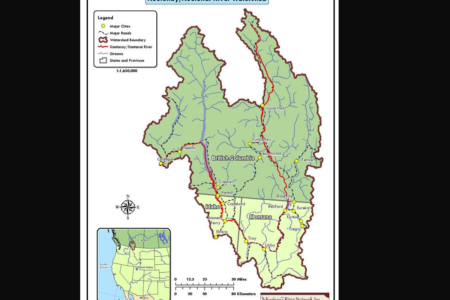How will climate change affect Rossland down the road? One committee has been working on that very question
What will Rossland’s climate look like 30 to 50 years from now? What positive and negative impacts will the city feel from that change? Of those changes, what are the highest priorities for Rossland and what can and should we be doing now and into the future to cope? Those are the ultimate questions that Rossland’s Climate Change Adaptation Steering Committee has been working on for the past year.
Sponsored by Columbia Basin Trust as phase two of their Adapting to Climate Change series, Rossland, Castelgar, and Kaslo have each run steering committees for the past ten months. Now, nearing the end of their one year tenure, the Rossland committee will soon be looking for more participation from the public to complete their goal of producing a climate change action plan for Rossland.
Shortly after commencing last November, the group established a steering committee of 14 Rossland residents, sustainability Commission representatives, and city staff. Naming Aaron Cosbey as their chair, the group set off on a six step journey towards their action plan.
The first couple of months were spent learning about climate change adaptation and figuring out what the top priorities for Rossland would be.
“We looked at things like higher temperatures, earlier spring run offs, higher precipitation and so on,” explained project manager Jennifer Ellis. “Those are some of the changes that could occur in Rossland over the next 20 to 50 years, so what does that mean to us? So it‘s learning about climate change to identify the potential impacts that could occur in Rossland as a result. We came up with a list of six potential priority issue areas that we thought were the most important.”
Those six issue areas (Water, Infrastructure and built environment, Food security, Energy supply and pricing, Extreme events and Socio –economics) were then pared down to three through a public input event last March. Water, Infrastructure, and Energy were ultimately selected, with Food security getting its own study and background in addition, funded by CBT.
Simon Fraser University (partners in the project) did an initial draft of the vulnerability and risk assessment for each issue area and the committee is just now completing a final draft of their report.
Food security, which initially was chosen as one of the top three priorities, was turned down by SFU as they felt the issue was too global in scale and wanted to focus on the specifically local. Not wanting the issue to fall off the table CBT funded an additional study on food security as it also made the top three in Castlegar and Kaslo.
Locally, that study looked at the amount of agricultural land in the RDCK and RDKB versus the land required to support our population.
“What we found was that it takes roughly 0.5 hectares per person to support the population, explained Ellis. “We have more than enough agricultural land in this area to cover our populations. The real issue in this case is that we no longer have the systems, knowledge or facilities to grow that food here.”
The full report is available as a file attachment to this story.
With the research and planning work now largely behind them, the committee’s next phase involves going back to the public with what they have learned and establishing action items for each issue. This will be happening on September 9th. Details will follow as announced.
Following public input, the committee will present its action plan to city council.
“They’ll go to city council and hopefully they will say we like them and implement some of them. We’re not trying to remake the wheel here in any way,” added Ellis. “Some of the actions that will be identified have already been identified in the Sustainability Plan and the Official Community Plan. We’re hoping to give them a little more emphasis by re-identifying them as also important to climate change adaptation.”
Each action item will be assigned a priority and implementation plans will be developed for each. As noted by the committee, the depth of the implementation plan will depend on just how many action plans are generated at the September 9th event. If they develop a short list of actions with significant agreement on them, they can go a little deeper and develop those schedules. If it’s a long list of actions, the depth of the plans will be limited.
Moving forward, the group is urging residents to attend and participate in the upcoming event. Quite literally, planning for Rossland’s future adaptation to climate change is in the people’s hands.
As for the implementation and what will happen with that plan once in council’s hands—we’ll just have to wait and see.


























